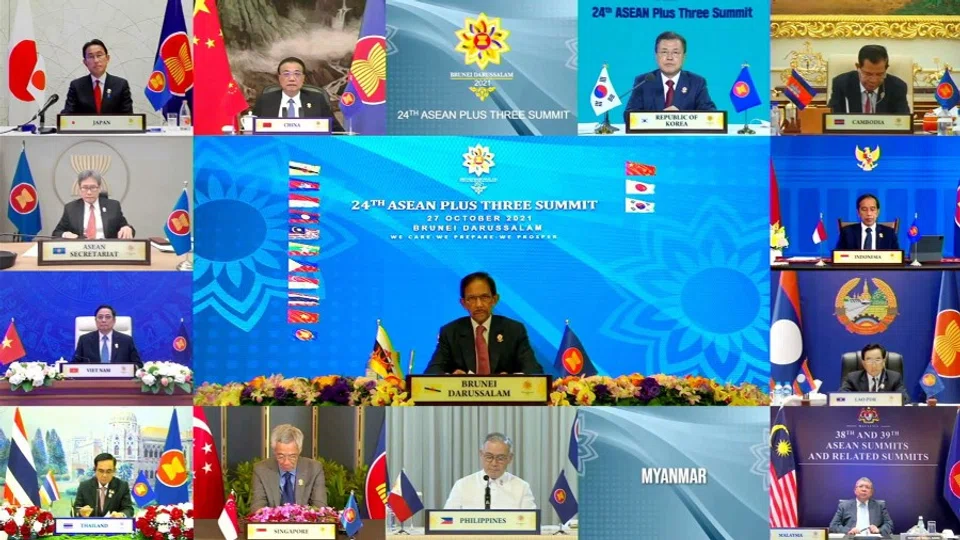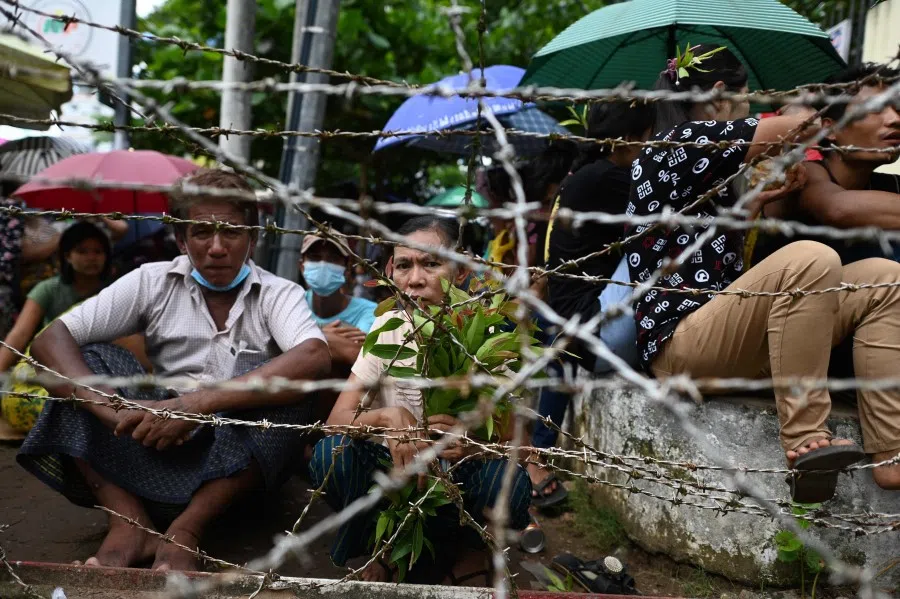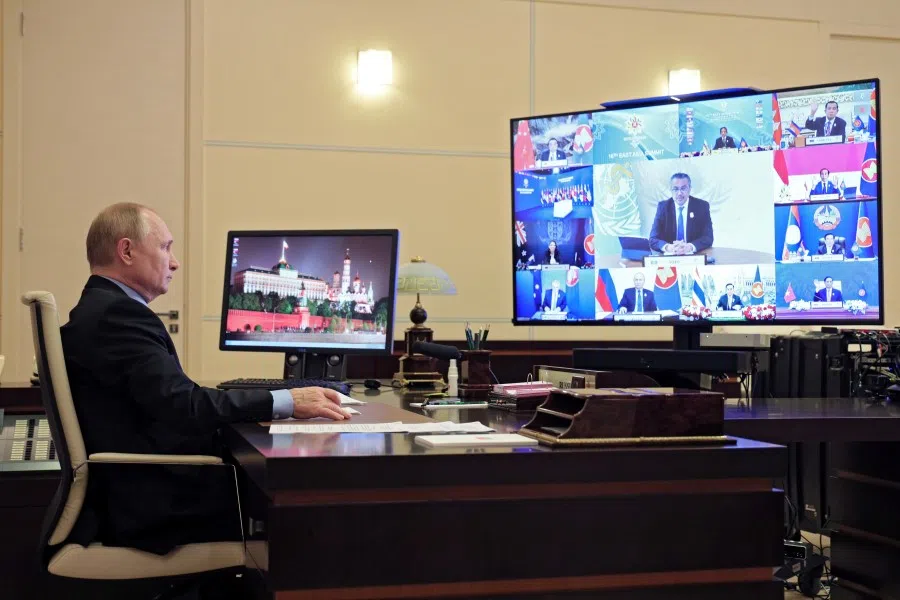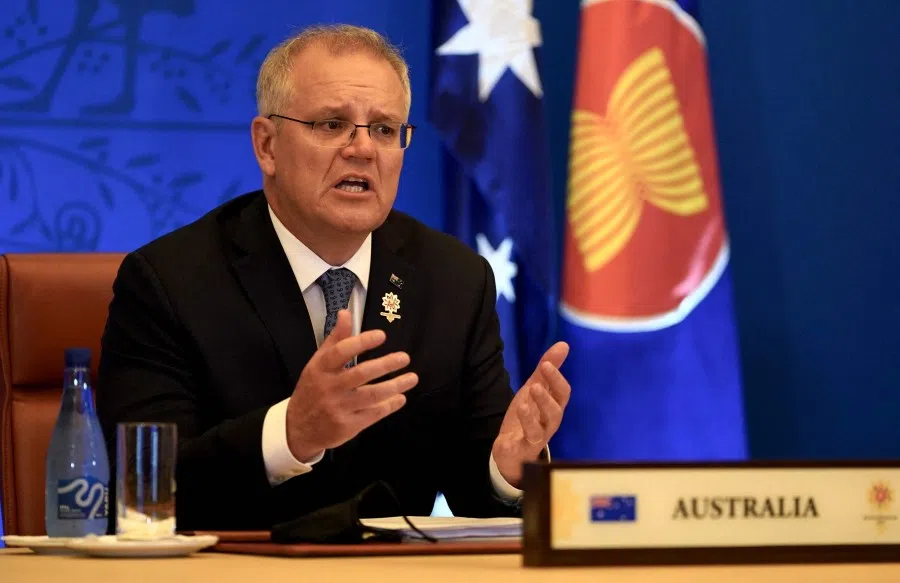ASEAN's deft diplomacy with its dialogue partners
Kong Tuan Yuen notes that this year's virtual 38th and 39th ASEAN Summits and Related Summits achieved several deliverables, including commitments from dialogue partners such as China, Japan and the US for increased Covid-19 assistance and other cooperation. The grouping also agreed to establish a comprehensive strategic partnership with China and Australia respectively. ASEAN's desire to maintain its centrality is clear from the way it has timed the two comprehensive strategic partnerships and the stance it adopted on ASEAN member state Myanmar's representation.

The 38th and 39th ASEAN Summits and Related Summits were held online on 26-28 October, chaired by Sultan Haji Hassanal Bolkiah of Brunei Darussalam, which holds the chairmanship of ASEAN in 2021. It has been 45 years since the first ASEAN summit in 1976. As ASEAN's highest decision-making platform, the ASEAN summit has provided many policy suggestions and solutions for political, economic and social issues in the region and made significant contributions to maintaining the region's peace and stable development.
For instance, the Regional Comprehensive Economic Partnership (RCEP) agreement, which is likely to take effect early next year, was put forward at the 19th ASEAN summit in 2011. The ASEAN summit is usually held twice a year but, due to the dire Covid-19 pandemic in Southeast Asia, the 38th and 39th summits in each half of this year were combined.
A stance on grouping member Myanmar
The ASEAN summit is no longer just about discussing and seeking consensus on internal issues in Southeast Asia, but is a platform meant more for countries beyond the region that wish to establish closer political, economic and national security cooperation with ASEAN. The summit this time is of great significance and far-reaching influence for ASEAN member states. While the military coup in Myanmar has brought a series of challenges to ASEAN's internal unity, ASEAN has made enormous achievements with external partners through the summit.
On whether to have Myanmar's junta government attend the summit, ASEAN member states held an emergency foreign ministers' meeting before the Summit, urging Myanmar to resolve its current crisis based on ASEAN's Five-Point Consensus. This includes the immediate cessation of violence in Myanmar and for all parties to exercise utmost restraint; for there to be constructive dialogue among all parties to seek a peaceful solution in the interests of the people; for the Special Envoy of the ASEAN Chair to facilitate mediation of the dialogue process, with the assistance of the ASEAN secretary-general; and for ASEAN to provide humanitarian assistance through the ASEAN Coordinating Centre for Humanitarian Assistance (AHA Centre).

ASEAN made the compromise of inviting a non-political representative from Myanmar to attend the summit. However, this decision led to Myanmar's boycott and absence at the summit. While this has led to an incomplete ASEAN at the meeting, it has fully demonstrated the ASEAN member states' consensus regarding the Myanmar military coup and will not affect ASEAN's unity.
Sultan Bolkiah said that Myanmar remains an integral part of ASEAN and its membership should not be questioned, and that ASEAN member states will continue to provide assistance to Myanmar based on the Five-Point Consensus.
Covid-19 and economic recovery high on list of concerns
The ASEAN summit focused most on measures to deal with Covid-19 and economic recovery. To combat Covid-19, ASEAN has adopted the Bandar Seri Begawan Declaration of the Strategic and Holistic Initiative to Link Asian Responses to Emergencies and Disasters (ASEAN SHIELD), to "ensure ASEAN's collective, rapid, effective and timely response in mitigating the impacts of different types of emergencies and disasters that have or may affect the Southeast Asia region".
Evidently, countries beyond Southeast Asia are paying increasing attention to ASEAN's role in this region.
On economic recovery, ASEAN is executing the ASEAN Comprehensive Recovery Framework (ACRF) and its Implementation Plan as the region's consolidated exit strategy from Covid-19 through "(i) enhancing health systems; (ii) strengthening human security; (iii) maximising the potential of intra-ASEAN market and broader economic integration; (iv) accelerating inclusive digital transformation; and (v) advancing towards a more sustainable and resilient future".

Apart from the ASEAN summit, bilateral summits between ASEAN and other countries are becoming increasingly important, with numerous changes this year. First, in addition to the bilateral summits with existing partners such as China, the US, Japan, Republic of Korea, Russia and India as well as the various joint statements issued during the three days of meetings, ASEAN held its inaugural bilateral summit with Australia. In addition, post-Brexit, ASEAN has given "dialogue partner" status to the UK this year. Evidently, countries beyond Southeast Asia are paying increasing attention to ASEAN's role in this region.
A comprehensive strategic partnership each with Australia and China
Second, ASEAN has established a comprehensive strategic partnership respectively with China and Australia at the same time. Through this partnership, China hopes to strengthen bilateral exchanges as well as extend cooperation from economic and trade investments to healthcare, pandemic measures, social security and digital economy. On its part, Australia wishes to strengthen cooperation with ASEAN on regional challenges such as healthcare, security, transnational crime and terrorism. It is also willing to share its experience on maritime cooperation, the UN Sustainable Development Goals 2030 (UN SDGs 2030) and connectivity, to help ASEAN with its important role in the Indo-Pacific region.
Third, ASEAN has made significant accomplishments in bilateral summits. China is willing to further increase its assistance to combat Covid-19 and cooperation on Covid-19 vaccines such as by assisting ASEAN member states to build regional vaccine production centres to promote vaccine accessibility, and strengthening cooperation in R&D, production and technology transfer of vaccines and specific medicine. Japan has committed US$50 million through the Japan-ASEAN Integration Fund to support the establishment of the ASEAN Centre for Public Health Emergencies and Emerging Diseases and the centre's exchange of research experts.
What is more interesting is that ASEAN has established comprehensive strategic partnerships with China and Australia at the same time this year.
The Australian government has also pledged to further contribute at least ten million Covid-19 vaccine doses to ASEAN member states and provide AU$124 million (about S$126 million) to facilitate ASEAN-Australia cooperation. US President Joe Biden has also announced that the US would commit more than US$102 million to deepen the ASEAN-US Strategic Partnership, which includes US$40 million to accelerate joint research, strengthen the healthcare system and train healthcare talents as well as US$20.5 million to support and promote ASEAN's climate policy to jointly mitigate global warming.

Balancing China as well as the US and its allies
What is more interesting is that ASEAN has established comprehensive strategic partnerships with China and Australia at the same time this year. In fact, China has expressed its wish last year on several occasions to enhance its relationship with ASEAN, but the upgrading of the ASEAN-China relationship is delayed until this year. This can be construed as ASEAN balancing the influence of China as well as the US and its allies in Southeast Asia.
In particular, some ASEAN member states have expressed dissatisfaction with Australia's trilateral security pact (AUKUS) with the US and the UK but are willing to establish an ASEAN-Australia comprehensive strategic partnership. This shows ASEAN's trade-offs in the context of the China-US competition. The contents of the chairman's statements of the ASEAN-China and ASEAN-Australia summits are almost similar, which shows that ASEAN does not want others to associate it to be inclined towards either of the two countries.
As Covid-19 continues to plague ASEAN member states for some time, ASEAN will remain geopolitically sensitive to claims of sovereignty and the freedom of navigation in the South China Sea, the repercussions of the controversial AUKUS, and the role and positioning of ASEAN in the Indo-Pacific strategy. The unity of ASEAN will also be tested.
Clearly, ASEAN does not want to pick a side amidst escalating China-US tensions. It will continue to actively communicate, coordinate and build on the good relations with both sides. After all, it is in ASEAN's best interests to emphasise its centrality and unity in the region.
Related: Wake-up call for ASEAN countries: Curb over-reliance on China and seize opportunities of global supply chain restructuring | Beyond ASEAN: More 'no-superpower coalitions' needed as US-China rivalry upsets global interests | The EU and ASEAN should join hands in cajoling China and the US towards peace | AUKUS: A reflection of ASEAN's inability to cope with China's rising assertiveness?


![[Big read] When the Arctic opens, what happens to Singapore?](https://cassette.sphdigital.com.sg/image/thinkchina/da65edebca34645c711c55e83e9877109b3c53847ebb1305573974651df1d13a)


